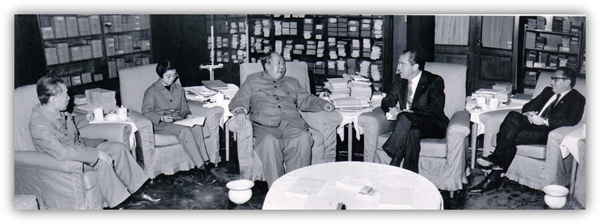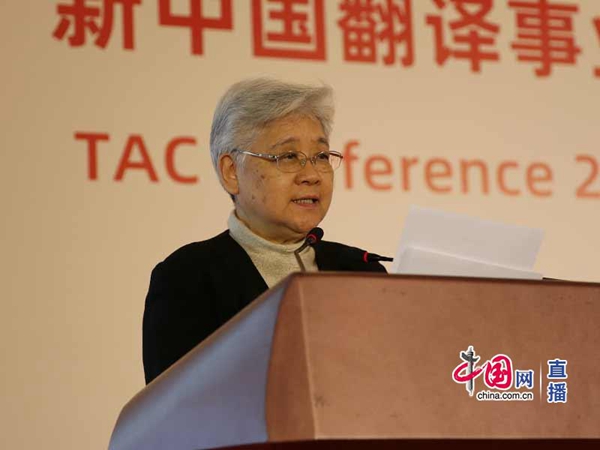
In April 1965, Tang Wensheng was taken in a bus with seven other college graduates to the Ministry of Foreign Affairs to begin work as an English translator in its Department of Translation and Interpretation.
That was the year she turned 22.
More than half a century later, as an advisor to the Translators Association of China (TAC), she recalled those times in a speech at the TAC's annual conference in Beijing on Nov. 9.
Back in the mid-1960s, long before the computer era, all new recruits had to learn how to type fast and without mistakes on a manual typewriter, and how to use different kinds of dictionaries. Besides the Webster's, the Oxford and various Chinese-English dictionaries, they also had to learn to use dictionaries on synonyms, collocations and thesaurus, and even dictionaries like the Duden. Tang was no exception, despite graduating from what is now Beijing Foreign Studies University.
She and her peers had to work long and even unsociable hours. Tang can remember clearly even decades later how, when translating urgent telegrams and diplomatic notes at night, she would feel in a sense of sanctity that her heart was beating with that of the motherland.
Later, Tang began to participate in translating Foreign Ministry statements, government statements and national leaders' speeches. No matter how short the piece assigned to her might be, she was required to make the translation of specific terms, names of people and places in particular, precise before she handed it in, and always studied the final revised version to learn from it.
"That's because we were speaking for the country," Tang said.
Gradually making progress, Tang got opportunities to interpret for China's founding leaders, Chairman Mao Zedong and Premier Zhou Enlai, which was not only an important duty, but also a touching experience.
In the early morning of Dec. 18, 1970, Chairman Mao invited American writer Edgar Snow to his residence just after he had recovered from a fever. Chairman Mao talked with Snow for over five hours from 8 a.m. to after 1 p.m..
Tang remembers clearly that Chairman Mao mentioned during the conversation that since U.S. President Richard Nixon had expressed the desire to visit China through many channels, he was quite willing to meet with him, no matter what the result might be.
At noon on Feb. 21, 1972, President Nixon arrived in Beijing for a weeklong visit. Chairman Mao met with him at his residence that afternoon.
Despite just recovering from a shock, Chairman Mao talked cheerfully throughout the talks, which lasted from 2:40 p.m. to 3:50 p.m., 55 minutes longer than expected. Every time after subsequent meetings that Premier Zhou held with President Nixon, Chairman Mao and Premier Zhou would confer on what had been discussed.
China and the United States officially established diplomatic ties 40 years ago in 1979, seven years after Nixon's visit, which was the decisive step towards normalization. Tang, a witness of the historical moment who was by the side of China's national leaders at that time, was deeply impressed by their visionary thoughts delivered through plain words, as well as greatly moved by their dedication to the country and the people.

The experience gave Tang a strong motivation, but she found that a wish alone does not make a good translator or interpreter. Tang asked herself the questions Chairman Mao had posed to her: Are you satisfied with merely knowing the ABC and earning 56 yuan a month? Why not go explore something, like where English originates from?
Along with Premier Zhou's reminder that interpreters should get to know what was being discussed, this was a big inspiration to Tang – getting to have a grip on what was being translated or interpreted. However, it was later when she began to work in the ministry's Department of North American and Oceanian Affairs that Tang gained a deeper understanding of the words.
After getting increasingly involved in diplomatic affairs, she found that translators or interpreters can hardly perform their tasks well without having a clear understanding of both sides, be it national conditions, policies and cultures, speakers and their opinions and positions, or the discussion topic and its background and essence.
Now, when looking back on those days, Tang said that other diplomatic translators and interpreters will have many colorful life stories, and that every one of them improves through diligent study and continuous practice.
The new era poses new challenges to not only diplomatic translators and interpreters, but also to those in companies and to media staff, who should always read between the lines, and explore ways to bridge the hearts of both sides, Tang said.
As an advisor to the TAC now, her heart is still attached to the interpretation of China decades later.
